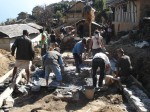
From the very beginning of the first Earth Summit in 1992, people realized that sustainable development could not be achieved by governments alone. It would require the active participation of all sectors of society and all types of people – consumers, workers, business persons, farmers, students, teachers, researchers, activists, indigenous communities, and other communities of interest. Agenda 21 formalized nine of these as the overarching categories through which all citizens could participate in the UN activities on achieving sustainable development. These are officially called “Major Groups”.
Up coming events:
Host Country Liaison: Civil Society Facilitating Committee to Rio+20 (CSFC)
A special committee of the main Brazilian civil society networks was created in late 2010 to help organize Brazilian civil society and engage with national and international partners, including the Government of Brazil and the UN Conference on Sustainable Development (Rio+20) Secretariat. Members of the Committee represent a diverse set of actors from all sectors including, among others, environmentalists, rural and urban workers, women, youth, popular movements and trade unions. These actors work in rural and urban regions, at both the national and international levels, on issues related to human rights, development modeling, environmental justice and sustainability.
An important role of the Facilitating Committee is to ensure an efficient flow of information between Brazilian civil society and the rest of the world, as well as to be the national focal point for the Rio+20 major groups coordinator. For that purpose, we will support initiatives of the major groups organizing partners and the Rio+20 Secretariat as required throughout the preparatory process and during the conference itself. Organizations are invited to engage with the Committee to help organize national activities and support international ones.
The Facilitating Committee also intends to host training activities and debates to support the mobilization of civil society throughout the Rio+20 preparatory process. One CSFC initiative will be the People’s Summit for Sustainable Development, a broad space for debating, networking and showcasing national and international civil society initiatives related to the Rio+20 objectives and themes, and organized to coincide with the conference.
The Global Union for Sustainability (GUS)
Believing that the success of Rio+20 will depend on follow-up to the conference, in October 2010 Brazilian and other international organizations launched the Global Union for Sustainability as a mechanism to track progress toward the implementation of Rio+20 outcomes.
The GUS brings together active organizations and leaders from a wide range of sectors into a global multi-stakeholder forum. The goal is to enhance cooperation and exchange of ideas on how to promote sustainable development, evaluate progress and identify gaps or shortages early in the implementation phase. In the run-up to Rio+20, the GUS will promote a range of on-site meetings and online activities aiming to provide valuable inputs to the conference, and to begin setting up a lasting follow-up process.
The GUS also intends to collect positive experiences related to the Rio+20 themes and objectives, encourage cross-fertilization and coordination, and transform the process into an effective way to face sustainability challenges and accelerate implementation of feasible solutions.
http://www.uncsd2012.org/rio20/majorgroups.html














